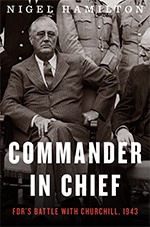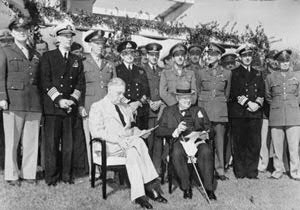Commander in Chief: FDR's Battle with Churchill, 1943

Although many biographies have been written about Franklin Delano Roosevelt (1882-1945), they have largely ignored or dismissed his command of all U.S. Armed Forces throughout the global conflict we call the Second World War.
Since the role of Commander in Chief in peace and war is one of the essential tasks of a U.S. President – mandated by its Constitution – and since that role has been exercised with both success and failure over the past seventy years of American global hegemony since his death, this dearth is a surprising gap in our biographical understanding and knowledge. Was America’s military victory in World War II only attributable to its generals and admirals – men like Marshall, MacArthur, Leahy, Arnold, King, Nimitz, Eisenhower, Patton and Bradley? Was Churchill really the architect and strategic mastermind behind the Allied winning of the war – as Churchill painted his own performance in his great six-volume memoir, The Second World War, which helped win him the Nobel Prize for Literature after the war?
Clearly, the death of Franklin Roosevelt from a cerebral hemorrhage on April 12, 1945, several weeks before the fall of Adolf Hitler, was a calamity for his biography as the dominant military leader of the western Allies, for the President had fully intended to write his war memoirs, and had already begun assembling the materials. He had, after all, rallied his country after defeat at Pearl Harbor on December 7, 1941, and had been the ultimate figure responsible for turning that misfortune into military victory – victory that then permitted the United States to become the world’s foremost postwar superpower, for good and ill.
This biography seeks to re-examine and more deeply research the character, modus operandi, decisions, relationships and true role of Franklin Delano Roosevelt – who often called himself an ‘obstinate old Dutchman’ – as U.S. Commander in Chief of the Armed Forces of the United States in World War II.
The work will take as its focus, Roosevelt’s life at the point when the U.S., having waged a war of defense in the Atlantic and Pacific after Pearl Harbor, moved onto the offensive – i.e. the period between the Allied invasion of Northwest Africa (‘Torch’) in November, 1942, and the Allied invasion of the mainland of Europe (‘Avalanche’) in September, 1943. It will apply a close-up lens to the President, using contemporary diaries, archival sources and subsequent historical works, as well as interviews with surviving wartime subordinates and members of the Roosevelt family. It will reconstruct, as far as possible, Roosevelt’s military performance in eight selected events or pivotal decision-making moments of that year: Casablanca, Kasserine, the killing of Admiral Yamamoto, the Trident Conference, the Allied invasion of Sicily, the U.S.-British-Canadian conference at Quebec, the summer spat with Stalin, and the Allied invasion of Italy.

Not only reconstructing 1943 – the pivotal year of World War II – from FDR’s perspective, but taking critical issue with Winston Churchill’s account as well as the memoirs of senior American generals, it will hopefully lead to a deeper appreciation of FDR’s role, and provide a fresh reassessment of the strategy and direction of World War II, as it was experienced at the White House, Map Room, Hyde Park, Shangri-la, and on Roosevelt’s travels both across America and to North Africa.
Supervisors of this project are Prof. Hans Renders and Prof. Doeko Bosscher.
- Interview Elsevier 24 October 2015 (website version)
- Announcement lecture 2 May Historisch Nieuwsblad/The John Adams Institute and prepublication Roosevelt vs. Churchill: bevelhebbers in oorlog - 1943
- Promotion video with Nigel Hamilton on Dutch edition Roosevelt vs. Church ill: Bevelhebbers in oorlog - 1943
- Interview de Volkskrant 4 May 2016
- Article Mail on Sunday (Daily Mail/Mail Online) 22 May, 2016
- Review Boston Sunday Globe, June 5 2016
- Interview WWNO/New Orleans Public Radio, 21 June 2016
- Review NRC Handelsblad, 5 August 2016
- Review The Wall Street Journal, 20-21 August 2016
- Review The New York Times, 13 November 2016
- Interview CNN, 28 February 2017
- Interview Broerstraat 5, October 2017
- Interview in de Volkskrant on occasion of the 75th anniversary of D-Day
Nigel Hamilton wins prize for best thesis
The board of the Nicolaas Mulerius Fund has awarded the annual Wierenga-Rengerink prize to Nigel Hamilton. He defended with cum laude his thesis Commander in Chief: FDR's Battle with Churchill, 1943, written under supervision of the Biography Institute. The jury of the prize consists of all former rectores magnifici of the University of Groningen and the current rector magnificus. The prize is awarded this year to the two most outstanding PhDs of 2016, who will receive € 5000 each. On July 7, 2017 Hamilton will receive his prize during the Summer Ceremony, the final day of the academic year.
E-mail: Nigel.Hamilton umb.edu
